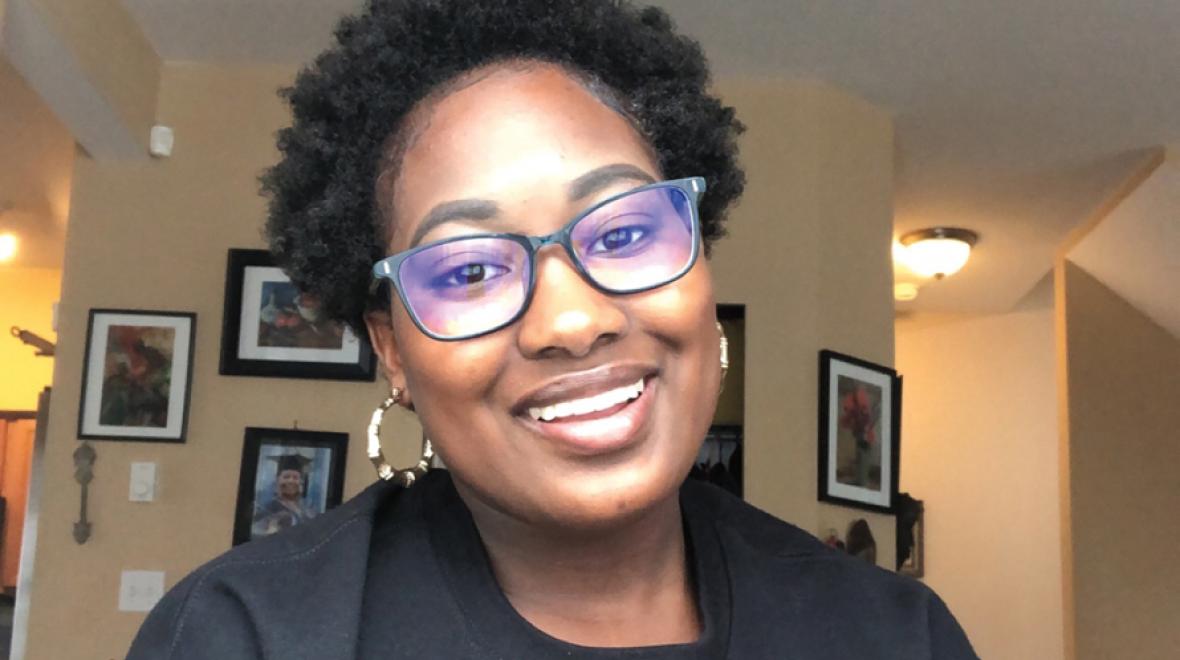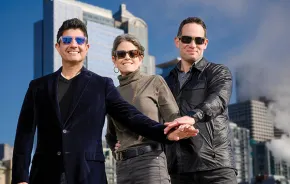
Editor's note: This article was sponsored by the Bill & Melinda Gates Foundation.
Angelina Riley got a great piece of advice from her mother, one that she lives by: It’s okay to be mad at the world, but you’d better be effective about it. The 17-year-old Rainier Beach High School junior is active in student government and the Black Student Union. She is also a campaign leader with the Food Empowerment Education and Sustainability Team — better known as FEEST — an organization, led by youths of color, that works to transform the health inequities impacting South Seattle and South King County schools. At the foundation of FEEST’s work are youth-led dinners where students convene to share food, celebrate culture and build community with their peers. Also central to the FEEST mission is supporting its youth fellows to work for the policy changes that will lead to improved and equitable access to healthy, fresh food at school.
I had the opportunity to catch up with Riley to learn more about her work with FEEST and her plans for the future.
How are you and your family managing during this quarantine?
At first it was kind of difficult, because I’m just so used to never really being in the house and always going to meetings somewhere. Or if I’m not at a meeting, I’m at school. When the quarantine first started, I realized I haven’t been in this house and just hung out here for so long. It’s been pretty fun. We’ve spent a lot of this time bonding.
How did you become involved with FEEST and what is your role in the organization?
I started with FEEST in December of 2018, I think. I had a friend who was in it, and she invited me to one of their meetings. I love to eat, so I assumed it was going to be one of the meetings that the dinner team does. There are two different teams: There’s a campaign team and there’s a dinner team. Both teams operate around the whole idea of food justice and social justice, and how communities, particularly low-income communities and communities of color, are affected by systems in place that aren’t providing them with the right food. You see food apartheid happening as you go south of downtown Seattle. You see more fast food restaurants.
I started FEEST not really knowing what I was getting myself into, but I remember coming to that first meeting, and our program director introduced me to all of this systematic oppression that goes on. I kind of knew things before, but when she really dove deep in and explained to me how these things were affecting neighborhoods [like mine], I started realizing how people really don’t eat school lunch, and how a lot of times on campus we see students who are hungry, and we see students who are tired in classes because they don’t feel like they can function, and they don’t like the school lunch. The school lunch that’s being provided usually isn’t as healthy as they say it is.
We started having meetings with the district’s director of nutrition services at the time. His name is Aaron Smith. He had just gotten into the role, and he was trying to change the district menu. We were learning from him all about the barriers that he was facing regarding federal laws and regarding how much money the state gives him for lunches and things like that.
It’s been a journey, but it’s been nice working with him because he is really invested as well. Almost 90 percent of our population of students at Rainier Beach requires free and reduced-price lunch, so he’s been trying to make sure that all students get lunch for free. He’s been trying to bring in fresh fruits and vegetables. He recently has been working with different community leaders to make sure that the farms that are around our neighborhoods provide some fresh produce to the schools and make it accessible to people living in the neighborhood.
I’m a campaign leader. Basically, I have meetings with people like Aaron Smith. We host events at school and around our community talking about the importance of eating healthy and why it’s important for youth to understand food apartheid and how it affects them. So that’s the work I do with FEEST.
How is the organization mobilizing to support people in the community right now, in light of the COVID-19 pandemic?
A few weeks ago, we started a food drive. We have a link on the FEEST Instagram account [@FEESTseattle], and if you sign up, someone will get groceries for you. It was an idea that FEEST fellows had — our group is all about food safety and food security, and so we wanted to make sure that that’s accessible. Apart from FEEST, I’ve also been working with my school to make sure we have our site ready for distributing food to families who need it. We’re also distributing other supplies, like pencils and clothing, and other things like that. That’s what we’ve been focused on.
Do you have any words of wisdom for young people who are trying to figure out how to get involved in issues that matter to them?
The whole activism journey first starts with educating yourself. The fact that you see that there are issues is already a big step. Because so many youths are on social media, start there. Use it for good. That’s how I originally found my voice. And from there, take that action into the streets.
How would you advise a parent to support their child in taking action?
I think something that my mom is really, really great at is, when I first started getting into these clubs and things, she got involved as well. She came to one of my first big events with FEEST, and she was there, she was supportive. She donated. She always sits down and listens to me rant about the system and all these injustices; she listens and then she asks, “What are you going to do about it? I know this stuff. Tell the world.” So, just always be there to listen to your child.
I think another thing that my mom has been really great at is giving me access to resources, and also just calming me down. Sometimes I get really mad at the world and she’ll say, “Okay, you’re mad at the world, but just be effective about it, and just know that change is slow sometimes, and that’s okay.”
What’s your plan for when you’re done with high school?
I’ve always valued education and getting a higher education, because my family wasn’t able to do that. I think just breaking generational curses is a big part of my plan in life, and so I’m going to apply to Howard University and to Spelman College. I’m not really sure what to major in yet, but I’m leaning towards international relations and international affairs.
What do you hope will be a positive outcome of this pandemic?
I think the silver lining of this pandemic is just having everyone recognize how messed up our policies are and how reactionary the work is. We could have had a health-care system in place before we started worrying about where all these people were going to go. We have thousands of people sick, and some people just can’t get tested or don’t have any means to get tests.
It should never take a disaster for us to realize that there are problems, and we should work to solve those problems in our system. I’m really hoping that energy continues after this is over, and people decide to work harder at making sure things are accessible, resources are spread equitably and so on and so forth.
What’s the first thing you’re going to do when this crazy time of house arrest is over?
When we get out of quarantine, the first thing I’m going to do is to head straight to the mall. I’m going to my favorite restaurant, and I am going to eat sushi. I’m so tired of eating at home every day!












